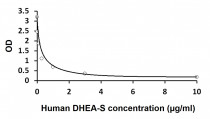ARG80837
Human DHEA (sulfate form) ELISA Kit
Human DHEA (sulfate form) ELISA Kit for ELISA and Human
Signaling Transduction kit
Overview
| Product Description | ARG80837 Human DHEA (sulfate form) ELISA Kit is an Enzyme Immunoassay kit for the quantification of Human DHEA (sulfate form) in serum and plasma (EDTA). |
|---|---|
| Tested Reactivity | Hu |
| Tested Application | ELISA |
| Target Name | DHEA (sulfate form) |
| Conjugation | HRP |
| Conjugation Note | Substrate: TMB and read at 450 nm |
| Sensitivity | 0.002 µg/ml |
| Sample Type | Serum and plasma (EDTA). |
| Standard Range | 0.03 - 10 µg/ml |
| Sample Volume | 10 µl |
Application Instructions
| Assay Time | 1 h, 15 min |
|---|
Properties
| Form | 96 well |
|---|---|
| Storage Instruction | Store the kit at 2-8°C. Keep microplate wells sealed in a dry bag with desiccants. Do not expose test reagents to heat, sun or strong light during storage and usage. Please refer to the product user manual for detail temperatures of the components. |
| Note | For laboratory research only, not for drug, diagnostic or other use. |
Bioinformation
| Gene Full Name | DHEA sulfate form |
|---|---|
| Background | Dehydroepiandrosterone (5-Androstene-3 beta-oL-17-one, Androstenolone, Dehydroisoandrosterone, Transdehydroandrosterone, DHEA) is a steroid hormone present in blood mostly in its sulfate form (DHEA-S). DHEA-S is a more specific product of the adrenals and measurements of this steroid are widely used in clinical practice. The clinical importance of plasma assays of DHEA-S is associated with the diagnosis of adrenal hyperplasia and differential diagnosis of hirsutism. Dehydroepiandrosterone sulfate (DHEA-SO4) is almost exclusively synthesized by the adrenal cortex, and it is the most abundant steroid hormone in the peripheral circulation. It is the main source of the urinary 17-ketosteroids. The metabolic clearance of DHEA-SO4 is slow, and it is converted mostly to oestrogens. The hormone has a maximum level from puberty until 20-30 years of age, then there is a gradual decrease in the blood DHEA-SO4 concentration mainly in the menopause of women. Although the physiological role of DHEA-SO4 is not well established the serum level of this steroid hormone has an informative pathophysiological value. 1. The serum DHEA-SO4 radioimmunoassay seems to be a reliable tool to assess adrenal androgen function and the glandular overproduction of androgens. 2. High DHEA-SO4 values indicate a virilizing disorder of adrenal origin in women. This includes mainly adrenal neoplasms or early or late onset of congenital adrenal hyperplasia. 3. Monitoring the DHEA-SO4 concentration may be useful to control the adrenal suppressive therapy (dexamethasone). 4. Low DHEA-SO4 levels can be an indicator of hormone-dependent immunological disorders. 5. Low levels of DHEA-SO4 may be related to the development of diseases that increases with age such as cancer and atherosclerosis. In these circumstances a systematically repeated assessment of the blood DHEA-SO4 values is recommended. |
| Highlight | Related products: DHEA antibodies; DHEA ELISA Kits; New ELISA data calculation tool: Simplify the ELISA analysis by GainData |
| Research Area | Signaling Transduction kit |
Images (1) Click the Picture to Zoom In
| Title | Download Link |
|---|---|
| ARG80837 Human DHEA sulfate form ELISA Kit User's manual |
 Download Download
|






